Most Recent News


Popular News



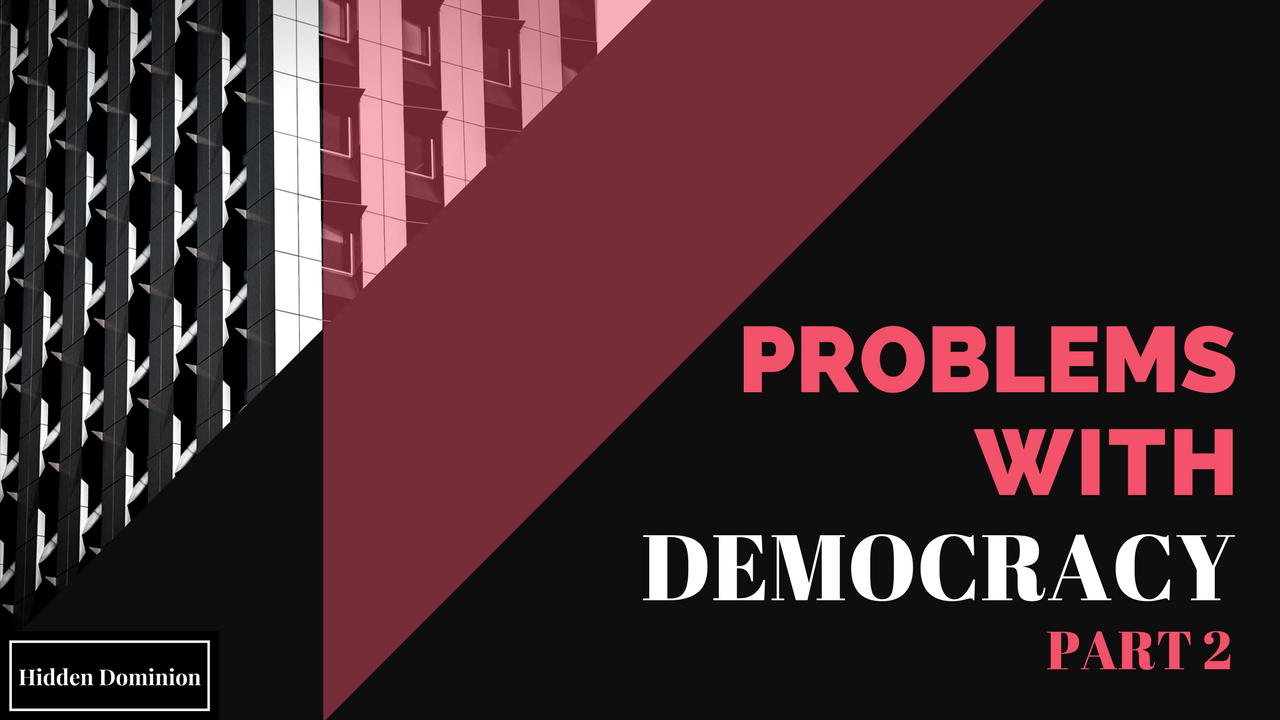
Continuation of Part 1's Essay on Why Republics Fall. What's wrong with democracy? View our list of 36 Problems with Democracy.
This list is a discussion on the representative (republic) form of democracy. It’s a two-part series on the problems with democracy, and why republics fall. Overall, I’ve accumulated 36 principal problems inherent in a republic form of democracy. This is not an all-inclusive list, and there are undoubtedly more issues inherent with republics, but it’s an excellent resource to get started with.
Check out the first chapter here: Problems With Democracy – Part 1.
View the second chapter here: Problems With Democracy – Part 2.
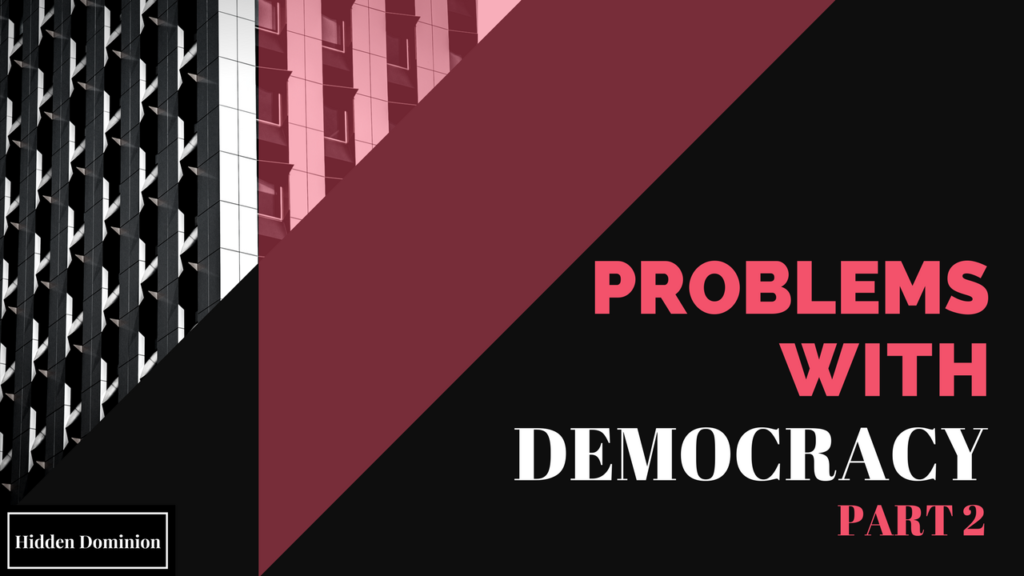
If you paid any attention (at all) to the 2016 Presidential Election, you probably heard about the Russian conspiracy.
You know, how Trump is a Russian puppet and paid-off by Vladimir.
It’s an age-old tactic. Label your opponent in connection with ‘the bad guys‘. Regardless of if they are actually bad guys, or even if there is actually a connection.
It’s a simple boogeyman tactic. Every politician uses it. Every political lobbyist uses it.
Even the small time local senator will tell supporters that his/her opponent is in bed with someone. Whether it’s big oil, the NRA, the SPLC; it doesn’t matter. It provides a clear line of “This person is bad, because they might have a connection with someone else that I don’t like”.
Why this is so prevalent in democratic societies, I’m not sure. It is a factor in the tragedy of commons problem from Part 1. If everyone on the other side of the political spectrum that you don’t like is labelled as a puppet of “the bad guys“, it degrades trust in the government structure as a whole.
It also presents a scapegoat to blame all the problems on. And we know how that ends up. It leads to extremism and a degradation of morals; and in some cases, an end in the democratic society as a whole.
Within republics, there are a few key arenas that are supposed to remain neutral. Unbiased and unaltered.
But, with time, they degrade to partisanship. After a while, they are practically indistinguishable from the party blocs.
There are two excellent examples of this problem with democracy:
We’ll tackle the Judicial Branch in the next section.
Let’s talk: Journalism
Now this comes to no surprise to anyone: but the media is biased.
They report based on party lines and beliefs. Journalists also reconstruct narratives to fit an agenda that their owners want to push.
They are also the ones that are supposed to remain completely neutral in reporting the facts, and the facts only. But instead there’s been a huge rise in “commentary journalists” that report their feelings instead of facts.
It should be no question why this is dangerous to democracy. When the people in charge of giving the information to the public are corrupt, partisan hacks how do we resist the indoctrination?
The entire voting electorate can be switched by changing the views on the media. If people trust what they see and read all the time without adequate research, they can single handedly be the driving force that destroys a republic and her freedom.
This process is in more than just the judicial branch and journalism. It creeps into every factor of a republic, eventually. For the simple reason that the political parties need to use every tool at their disposal to keep a check on the population. They need a constant stream of their values to inhibit everything in peoples’ lives to get them the vote.
With time, every arena in a republic becomes politicized. At least, until it all collapses and there is no longer a rule by majority.

The judicial branch was originally enacted to be a factor in the checks and balances between the executive and legislative branches of government. Their job is simple: Make sure laws are legally constitutional. Ensure that nothing infringes on the rights and respect granted by the Constitution.
This is a nonpartisan task. There should be no need for politics to be involved. But they are.
Trump’s immigration ban was blocked twice by 2 ultraliberal judges. When Obama levied the exact same immigration ban a few years prior, no one attempted to block it.
Along the same lines, the Supreme Court voting results are commonly known before the vote actually happens. Why? Because they vote on party lines.
It’s easy to find a way to justify your beliefs. With the millions upon millions of legal doctrines, there is definitely a way to interpret something to match your beliefs.
They aren’t partisan. Thus, they don’t ascribe to the original purpose of checks and balances. It becomes more and more prominent for judges to lay down rulings by party line instead of law. How can we ensure that we have a trustworthy government in a republic without the fair ability for our elected leaders to make actual laws without being blocked on party lines?
On top of all of this, within a republic, the constituency was supposed to be protected from the absolute majority by the constitution. But what happens when the judges start to reevaluate what the Constitution says to fit an agenda?
Oh, and they can’t be voted out either. So, political pawns are without the ability to get rid of them until they die. Excellent.
It’s been a reoccurring theme in this list to note the lack of trust in government and its representatives. But it’s also an issue of democracy as a whole.
Within representative republics, we vote for people based on their appeal instead of their ideology. Things like success are gauged based on wealth or power. Instead of what it used to be based on things such as virtuous, or moral character and ideology.
Because of this change of what is “appealing” to the general population, we reach a point where a lot of our political figures are distrusted. Because they are wealthy elite instead of proud wise-men, or die-hard soldiers. When was the last time we had a retired marine as a president? Or a philosopher?
Our presidents almost always come from top schools (solid networking platforms), law, and business. They are either career politicians, former lawyers, or top business executives.
Not necessarily the most honorable careers, are they?
Very few of our elected leaders come from a hard-working, blue-collar, or retired military background. Because the appeal and network opportunity isn’t there for them.
It’s yet another reason why a lot of political figures are generally considered as liars or swindlers. What they do in the office doesn’t help much either.
Democracy tends to keep the most honorable citizens amongst the ranks. While elevating the least honorable to the highest positions.
So, what is the elite theory? Here’s the definition:
A small minority of economic elite and policy planners make the plans for society. Small-time politicians are just squabbling and a distraction tool. The masses don’t have much power to change anything, even through voting.
This reflects a decline in democratic politics as an arena for debate and relegation to a merely formal level of discourse.
This macro-analysis points out a degradation of democracy and showcases that power generally lies outside the boundaries of elected reps.
I don’t buy into all the elite theories predictions and results. But they do have a few important points that are pretty obvious to anyone that knows international economics:
There are also the potential issues inherent with a managerial state.
These are all huge problems with democracy.
Would lobbying groups ever consider the opponent’s view? Unlikely.
Would multi-national corporations lobby politicians on the basis of what is best for the country? Never.
Does it matter that politicians are bought out? Absolutely. It has the potential to slaughter any chance of an actual democratic system. It’s not a republic if your leaders are controlled by corporations. That’s called a corporatocracy.
Corporations fund the advertising the can change narratives on certain social or campaign issues. Not just through lobbying for political positions, but also in regular everyday advertising.
This plays into the Elite Theory problem above. Corporations have the funding and profit-seeking incentive to alter narratives to fit whichever policy will better suit their bottom-line.
One author on globalissues goes on to state that:
For example, of the 100 largest economies in the world, 51 are corporations while only 49 are countries, based on a comparison of corporate sales and country GDPs.
In this era of globalization, marginalized people are becoming especially angry at the motives of multinational corporations, and corporate-led globalization is being met with increasing protest and resistance. How did corporations ever get such power in the first place?
Well, to answer that last question, they got it through free market democracy. It incentivizes companies to do just that, get more power and profit through globalization at any means necessary. Even if it weakens the native country. Democracy is individualistic by its nature and capitalist by requirement of “rule by many”. You can’t have a truly democratic economy that is controlled by the state.
But democracy is not a cure. The simple fact of the matter is: we don’t elect the market handlers. They are the CEO’s, CFO’s, and Boards. And when they are combined cumulatively, they have more power than any one politician could ever dream of, because of their multi-national status.
Democracy is at risk of collapse not just from within, but also from the outside forces of global corporatocracy that it allows inside. Think of it like the modern Trojan Horse.
It’s no question in republics that more money = more influence.
But it is an inherent problem as well.
Since elites tend to have more money, they have more influence. President Obama met with practically every single person on the “most wealthy” list of 2014. So all you need to meet with a president is to have enough money? No political connections or principal reason, just the capital. Why though? Because they have such a large say on lobbying groups and reelection and after election welfare for the incumbents.
Yet, as I’ve stated previously, we don’t elect them. Nor do we elect the financial executives that have a tremendous sum of capital at their disposal.
They can avoid arrest. They can better afford legal defenses. And worse, they can buy out politicians.
One example of the rule by capital is within the military industrial beast. Instigating war and lobbying for political candidates that are prowar simply for the manufacturing profits.
Another extreme example is the research field. Research is done based on enough interest in the topic. IE: The researcher needs to get funding from someone to do the research.
This research isn’t always based on honest academia credentials.
If a researcher needs funding, receives the funding, then goes against the interests of the ones’ who funded him/her, do you really think they will ever fund that researcher again? No. And they know this. So they play the game.
If you’re an anti-environmentalist, and a solar panel group gives you money to keep feeding yourself and research for a year; you have an incentive to keep the gravy train going. The inverse with big oil is true as well.
With more and more of these corporations and funding platforms letting their hand down to feed the researchers, the least trustworthy academia becomes.
Yet, it is still regarded as a very trust-worthy field (for now). So when the studies come out, people trust them. Even with peer review fraud, the reproducibility crisis, AND the funding scams.
These studies can have a direct impact on our culture, and thus our voting patterns and belief systems. It’s systematic repressive of facts, by capital holders, to sway an agenda and rule by corporates.
Rich politicians like to work with lobbying groups to impact legislation through think tanks to do the same.
When our thoughts are being subverted through less-than-honorable means, funded by capital, it presents a great obstacle to ensure a smooth-working republic style of governance. Might as well just call it what it is: propaganda machines.
Everyone knows that for a corporation to stay in business they need to have healthy profits.
It’s also common knowledge that every person needs money to live.
So profit-seeking in itself is not a bad thing; on the contrary, it’s a vital aspect of every human’s existence.
But when that drive to make profits inadvertently causes you to become shortsighted, it’s harmful to society as a whole.
Profit has been driven into our heads as the means of success. The most wealthy are the best off, but studies have shown that making more than 70k a year doesn’t really raise your happiness level in life. Because it’s just money.
It doesn’t fill any voids in us or give us any sense of pleasure besides a temporary high when we buy something. Even the guys that have Lambo’s get bored with them, eventually. It’s merely a status symbol that this kind of society engraves into us to make us assume that it is somehow important.
This drive for profit overrides everything. It consumes people and corporations to not just seek a healthy level of profit, but to seek the most money possible. Even if it harms the origin or your own native country.
This overriding drive for wealth that republics cause (typically through the capitalist mindset) will drag us all down with it. It’s what has led to a tremendous increase in outsourcing.
That mindset capitalist republics install into us like software functions to make us act against society as a whole. Instead of a team, we’re an individual. Individualism, while incredibly important, should be sustained only so long as it doesn’t harm other members of your nation. Democracy fails at accomplishing this, as the mindset of “money, b*tches, and cars” overrides everything.
In short, it creates a society driven by greed instead of virtue and national support. What’s the benefit if only a few individuals succeed while the entire nation goes down the drains? Those few individuals will become harmed by the negative effects of it, sooner or later. Them, or their children.
On the topic of capitalism; modern capitalism occasionally results in economic crises through a deficit of effective demand.
In plain English, society is occasionally unable to earn enough income to purchase the products that the nation produces.
See this statistic:
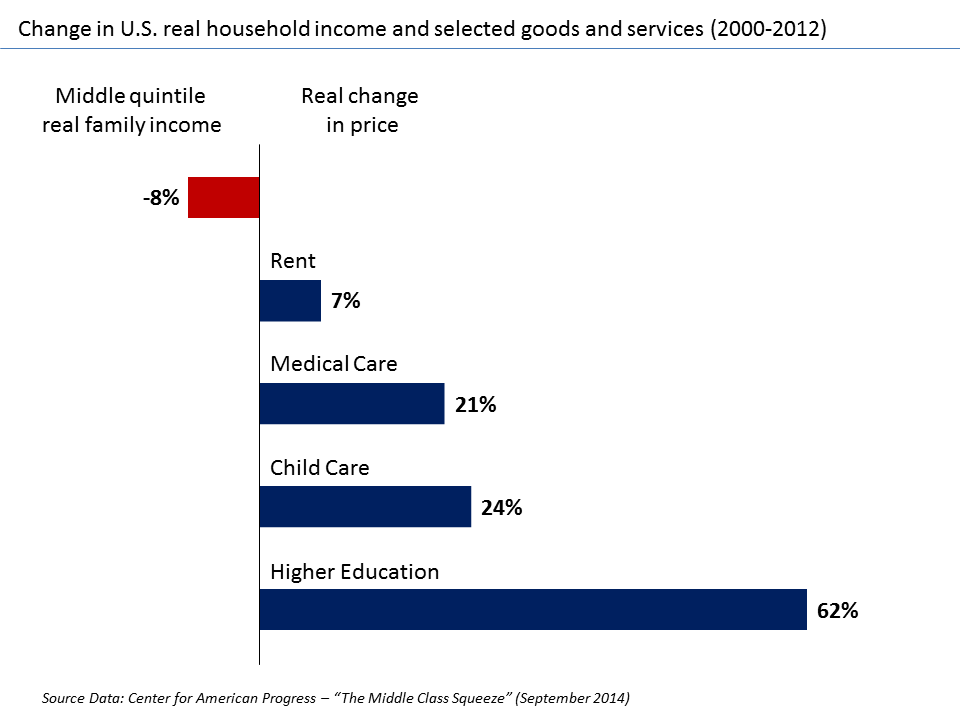
Prices of everything increases, while real family income decreases. The same income is not enough for people to purchase the exact same goods over time.
This is typically created through a variety of issues, such as:
I think the republics influence on inflation and the Fed control is pretty self-explanatory.
But one that requires more analysis is the corporate monopoly of common resources.
What happens is this:
Since corporations have a monopoly on certain common resources, they can change supply. They can do something called creating “artificial scarcity” to increase the price, while average/mean income remains the same.
This causes workers to lose consumer purchasing power. Then add in destroying their income, and the result is much the same as the negative effects of interest rates and inflation.
So what’s the end result? More power to the corporates. Which we’ve already discussed as one of the prime problems of democracy. Exacerbating the problems with democracy and individual economic opportunities.
Economists tend to understand this issue, but can’t link it to the human condition. That’s why I’ve always said there needs to be more philosophy in economics to truly “research” anything.
I considered titling this one “Rise of Hollywood Elites”, but they both paint the same picture.
Culture is probably the biggest issue facing every society. Society is built around people, people are built around culture. If the citizens’ views evolve, then the culture shifts in line with that, inevitably changing the culture. The reason we follow the Constitution? Because it’s in our culture. Why do we believe in law and order? It’s our culture. If we shift drastically, so does culture. It’s what happened prior to the Soviets taking control of Russia, and what happened prior to Venezuela becoming socialist.
And in republics, no one really contains or edits the culture besides the elite. Meaning they have the ability to shift the mindset of people, and eventually (over the course of years or decades), change the culture.
This puts us into a position where less-than-qualified people are in charge of changing societal norms.
Take some examples:
And an issue with this, inherent in democracy, is that culture tends to follow their example.
They have a monopoly on media and entertainment, so they can stomp out opposing voices and views. Many have commented on how it is nearly impossible to find a job in Hollywood if you have a conservative history. No one will hire you.
So these individuals, many of whom never had a real job, get to lead the culture in America.
In other forms of government, culture generally follows a stronger principle. Things like civic duty, nationalist sentiment, and a belief in something greater than yourself (your community, for example); are virtuous staples of society.
But not in democracy, where there is a monopoly on entertainment by the elite. Then, the culture is influenced by this sort of degenerate garbage. (Side note: Bill Nye doesn’t even have a degree in science).
It’s true that this isn’t just an issue with democracy. Fascism and socialist governments also tend to have a strict control on the news and media platforms as well.
But democracy isn’t free from it, like some want to believe.
Let’s just look at the general trust in the mainstream media:
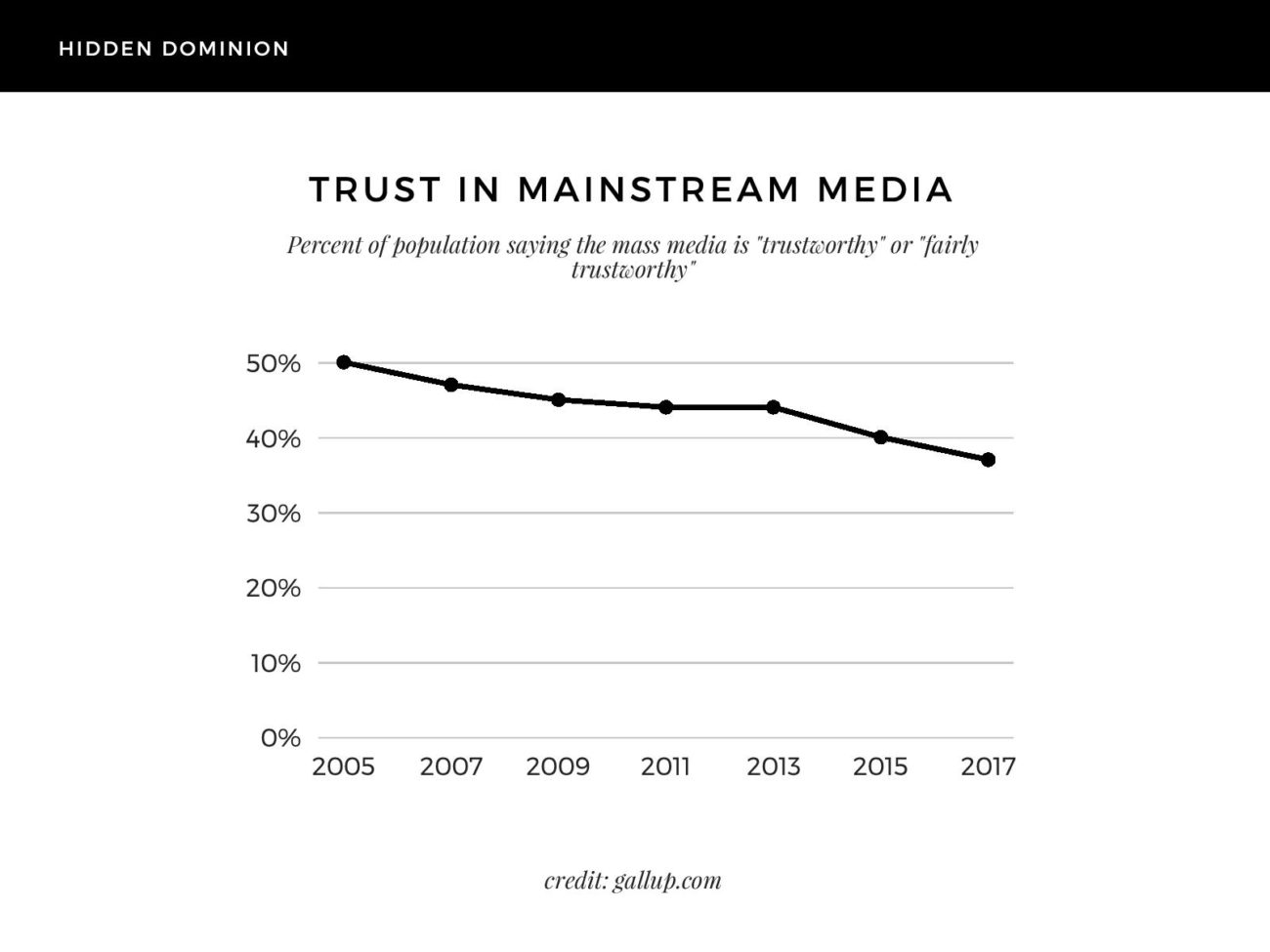
Now if the media is so virtuous in republics, why would it be rated so low by Americans and slowly degrading overtime?
Now, I may have touched on once or twice before…
All of these mainstream media sources work as if they are nationalized for a party bloc.
And, as we saw with the control of culture, the media also has a monopoly on news. Alternative news outlets have been popping up, but they are far away from every reaching the viewership that mainstream sources control.
The mainstream media may be private instead of public, but it is still elite-owned in either condition.
While the media in a republic is supposed to showcase faults and leaks, they only do so if it supports their political agenda. So instead of being honest journalists, they are in the establishment’s pockets just like everyone else (See: Rule by capital).
The media can disclose damaging material right before an election.
They can shape public opinion through their discourse.
They can edit and change opinion polls to who they want to win, to make the other side seem like it’s impossible to defeat them (See: Hillary vs Trump 95% to 5% chance of winning polls).
But single-handedly the biggest problem of all, since they have a monopoly on news, they get to deem what is “worthy” to be seen.
Consider Sweden, where crime has been skyrocketing and migrant rapes have made Sweden the rape capital of the West. Do they ever discuss this in the media? Nope.
While the crime rates of nonnatives started increasing in Sweden, was it discussed? Nope. They just stopped collecting race data.
So they get to determine what is “acceptable” for people to think about and discuss through media. For many crimes, if it’s not in the news, the vast majority won’t see it.
Media collusion and establishment control is a central issue plaguing democracies for this reason. Without adequate resources to form a conclusion, that thought-process will never reach its formation.
This causes many people to never even consider (or notice) the huge issues facing the country, because it’s never talked about in the news if it doesn’t align with the “correct” political agenda that the media is pushing.
Figured I was done talking about the thought-subversion problem? Nope. There’s more. Democracy is infamous with these problems.
Some of the most influential social media and technological platforms (Facebook, Twitter, etc.) engage in some/all of the following:
And then handing it over to the Feds. Eroding any sense of trust you could have in the right to privacy.
According to a 2012 Pew study: “73 percent of search engine users say that most or all the information they find as they use search engines is accurate and trustworthy.”
In another study in the Proceedings of the National Academy of Sciences, the authors wrote that “biased search rankings can shift the voting preferences of undecided voters by 20% or more.”
And that’s terrifying, because Google (with 60%+ of the market share) has been caught being incredibly biased while manipulating search engine algorithms in the past.
Facebook started a campaign to label things that they disagree with politically as “fake news”. And who are the ones deciding what is “fake”? Oh, just Snopes and similar sources. Highly untrustworthy, leftist “fact checker” websites.
While allowing others that break the same regulations… but are not conservatives.
See: Problem 28 and Problem 29 above.
But one of the biggest issues stemming from the problems of all the above is the argument for free speech.
These corporations, the social media moguls, are technically ‘private corporations’. Thus, they are free to do what they choose.
But why?
Why is something such as Google, allowed to openly subvert the minds of readers through search engine bias, when the stakes are so high? When undecided voters can be swayed as the study indicated?
Why should a private corporation be allowed to change the narrative, the dialogue, and what news/information can be seen to every single person using it? It’s clear most don’t know the bias 73% at a minimum, so it’s a huge issue that is not being addressed.
While these corporations do have rights (for some reason), respecting the rights of free speech should trump them. No corporation should have the ability to change beliefs by more prominently displaying their agenda-search over the free exchange of honest search engine information. None of them should have the ability to censor certain stories in favor of other ones that they are more politically aligned with.
Whether they are private corporations or not, they are public utilities that nearly everyone uses. It’s like polluting the water supply except instead of water, its thoughts and beliefs.
The same goes for Facebook and “fake news”, Twitter through deleting only certain accounts, and the spread of Fed tracking.
This issue is inherent in democracy because we consider search and social media corporations as “people”. Instead of what they are: associations. Which can, and will become corrupted as they grow in size and rely on other corrupted sources to survive.
Free speech, honest information, and an open dialogue on such vital internet platforms should not have this level of cultural and thought subversion capabilities. But within democracies, they have it all.
Governments in a republic seem very keen to lengthening their control over, well, everything.
Even if it isn’t in the best interest of their citizens.
Consider the GDP vs income over time:
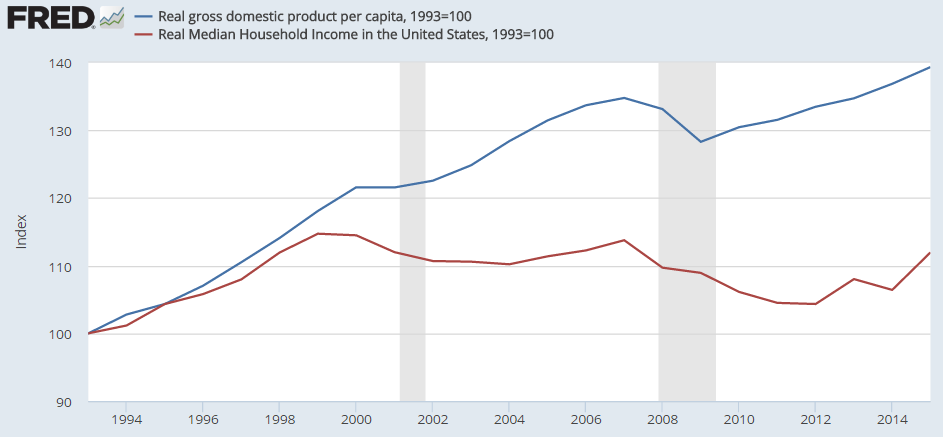
GDP goes up, incomes become stagnant. Government does better, but her citizens stay the same.
Governments desire to expand to hold more power, and have more influence over the different political applications (such as currency, media, the population, etc).
Probably the biggest of the ‘expansion’ issues is dependency on the government for its citizens to survive. This renders them dependent on the papa government to get anything done.
And how do they do it?
Within a democracy, governments will always seek to lengthen their control. The old conservatives did it through Christianity and traditionalism. The new left does it through social justice and virtue signalling. Any group does it through slow, deliberate moves such as changing cultural symbolism and academic leanings.
Through gun registration, increased surveillance, militarization of police forces, deliberate propaganda through social/mainstream media, or insane legalese, governments in republics find ways to expand their power base.
Even when it is unwarranted. And this additional government expansion through unjust means (and unjust reasons) is yet another key point in our discussion on problems with democracy.
Bureaucracy is:
a system of government in which most of the important decisions are made by state officials rather than by elected representatives
Typically involving numerous superiors and chains of command.
And what do we get with this type of administrative structure?
Instead of results, we have:
…And democracy is ripe with bureaucracy.
It takes years for anything to get done with the bureaucracy and nonpartisanship combined. This also causes politicians to not have a time frame to accurately get things done that they promised prior to election.
Laws are held up every single step of the way for scrutiny, even for pressing matters.
It takes a ridiculous amount of rewrites and appeals to get certain laws through. Especially executive orders. Which results in the process becoming so bogged down in legal terms, no one could ever truly read or accurately interpret it. It’s all in legalese. The document could be interpreted to mean anything the government wants it to be.
There’s also a lot of ambiguity in many of the laws. Making it “not clear” what is truly legal, or not. This is tending to occur more frequently within the last few decades. Because of the legalese of every single law, instead of laws based on common sense and easy understanding.
Where have we come as a society when half of our laws are so long and embedded with legalese that the general population needs a translator just to see what the law does? No wonder people don’t know what to resist, they can’t read it.
Moral relativism is:
The doctrine that asserts there is no global, absolute moral law that applies to all people, for all time, and in all places.
There is no overall “right and wrong”, but morality is based on each individuals perception of it.
There is no ultimate standard of morals, and no belief or statement could objectively be right or wrong.
In short, there is no moral code which could be defined by reasonable evidence or philosophy to be true. Only what each individual person considers moral is moral.
But obviously, this belief lacks any philosophical insight or common sense.
Consider majority laws. The very idea of a law is enacting/enforcing a standard that everyone is expected to adhere to. Don’t murder someone, it is bad. The majority agree with this statement, so it is not “moral relativism” but an actual factor of philosophical morality.
Without a type of moral unity, society becomes unstable. Crime increases, because it’s perfectly moral in some circles to commit crime. It’s not a moral principle if you look at it through moral relativism.
The very concept of right vs. wrong becomes a subjective statement. Shifting popular opinion determines morality.
Since laws and morality are just a subject of opinion, you can seek ways to avoid consequences, do whatever you want, and get away with it.
It’s an aversion to philosophy. Realistically, there has to be a way to compare two options and determine the more “moral” option. It’s not subjective. It’s objective.
Moral values should not change based on majority opinion.
It’s a bandwagon fallacy and also lacks insight into the question. Moral values can change if we realize we were previously wrong, but can’t just change based on every person’s subjective opinion.
One example of this is the acceptance of the culture of obesity.
Democracy has a hand in the rise of moral relativism, because it doesn’t focus on cultural shifts. A cultural shift is what originally leads to moral relativism, and without a capstone to resist it, the masses will also follow the cultural shift rather than objectivity.
Democracy also has a play in it by the use of individualism. Instead of looking for ways to philosophically connect and look at these questions through a collective lens, all that matters is “what is your own beliefs”. Republics place a big emphasis on the person, instead of the national identity. This results in many people going into their own imaginary bubble, denying reality or objective evidence.
Instead of looking at morality through the lens of a grounded philosopher, we look at it through our culture and upbringing, which is ever changing and increasingly subjective.
With the rise of moral relativism, we have a disoriented collective hive mind of degraded moral values. This hive mind can be used to target historical situations.
Think of things like the confederacy, degradation of masculinity and the Roman era. The collective opinion is that any symbolism of the confederacy is a terrible and horrific reminder of a more brutal time and must be removed.
But, it’s just a historical tradition. Taking modern ethics and morality and applying it to previous generations is just time-traveling moral relativism.
Our ethical and moral structure has improved over the years. Through education, philosophical insight, and a better understanding of “us”. But that doesn’t mean we can comb through history and apply our modern ethics on them. They didn’t have what we have at our disposal. And our own “morals” are increasingly becoming subjective, anyway.
And millenniums from now, they shouldn’t be placing their morality against ours either.
Judging the morality of the past by the standards of today is simply another result of moral relativism (see problem #34). And it helps in the degradation of our society/culture by instigating that our ancestors were all “the bad guys” and our society was built by evil. When in reality, nearly every country’s moral values were vastly different from what they are today.
A democracy cannot exist as a permanent form of government. It can only exist until the voters discover that they can vote themselves largesse from the public treasury.
From that moment on, the majority always votes for the candidates promising the most benefits from the public treasury with the result that a democracy always collapses over loose fiscal policy, always followed by a dictatorship.
These nations have progressed through this sequence: From bondage to spiritual faith; From spiritual faith to great courage; From courage to liberty; From liberty to abundance; From abundance to selfishness; From selfishness to apathy; From apathy to dependence; From dependence back into bondage.
the patriotic spirit and love of ingenious freedom … became gradually corrupted as the nation advanced in power and splendor”.
Democracy, in the past, has always led to one of the following:
Socialism when voters realize they can vote for “free” things and handing power over to a nanny state.
Fascism when individuals believing the degradation of culture and tradition cannot be stopped without extreme power and military force.
Globalism when the wealthy elite realizing they can capitalize on the wealth of all nations, through subjugating of the poorest of those nations (and their citizens). This is our current trajectory, see real income:
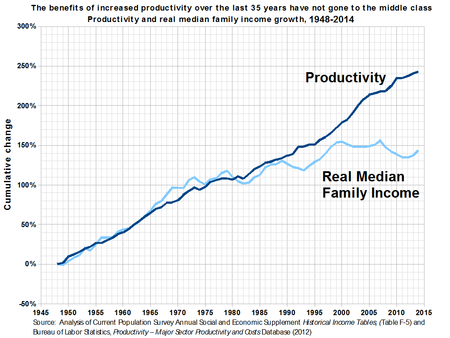
Full collapse through a combination of contributory democratic issues, such as what happened to the Roman Empire or Ancient Athens.
The problems inherent with democracies lead it to not being a style of government that can always withstand the test of time, without radical safeguards.
The original beauty of democracy, liberty and civic virtue, is constantly assaulted and inevitably corrupted. Until the pendulum swings and new leadership is ensured.
As the saying goes, and we have continually seen throughout history:
From liberty to abundance; From abundance to selfishness; From selfishness to apathy; From apathy to dependence; From dependence back into bondage
How can we prevent this? In a republic, I’m not sure. I don’t have the answer. I don’t claim to.
Maybe you can tell me. But after a lot of thought, I’m not sure it’s possible. But I could be wrong. I’d hate to see us fall to socialism or dictatorship. There has to be another way. But I don’t see it, yet.
Maybe we need something new entirely.
I’m not sure if democracy is the best form of governance we currently have at our disposal.
The alternatives are, well, less than pleasant.
But there are a lot of problems inherent in democracy, and republics in particular that are the same. Things that I believe we desperately need to find solutions for, if we want to keep our republic. If it is worth keeping, that is.
As I said at the beginning of this work, there are two things I hope you take away from this list. Here they are, yet again:
There are issues inherent in democracy. There also are specific attributes needed to keep it functioning like a well-oiled machine. These important attributes are degrading, as I’ve listed throughout this list.
If you know the solutions for some of these problems, I’d love to hear your thoughts below.
Comments are closed.
(Learn More About The Dominion Newsletter Here)
nationalist mertiocracy is (still) the answer
I blame the leftists
Don’t forget to blame the media, greed, weak-willed individuals, and partisan-jockeys